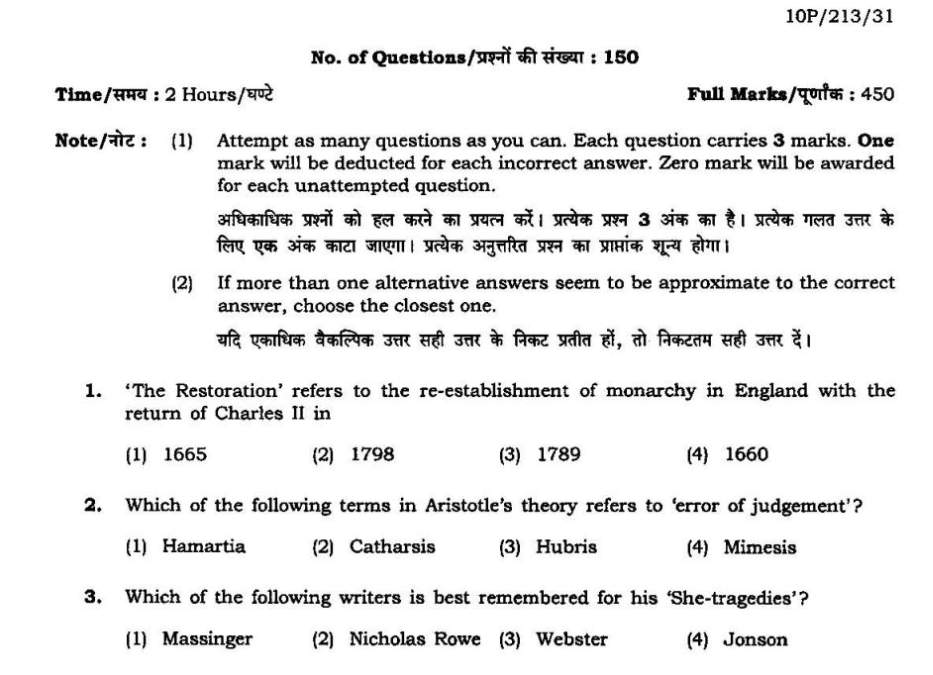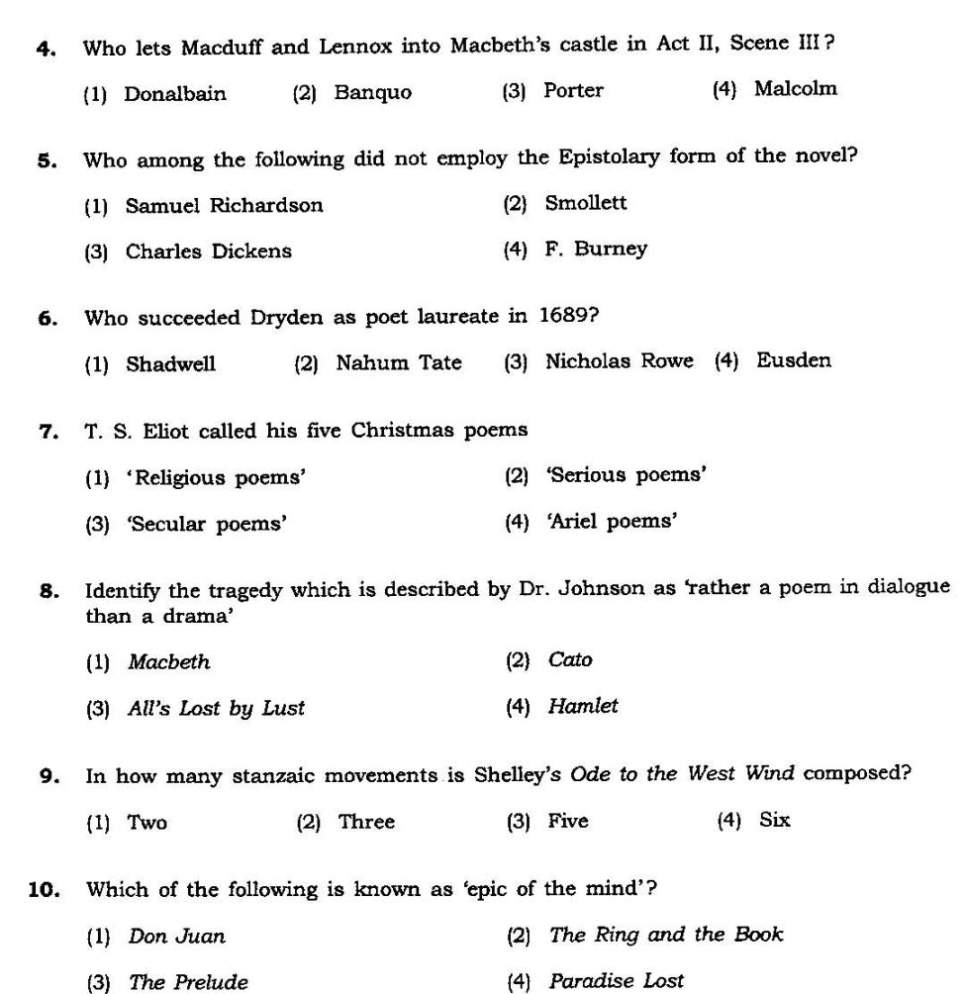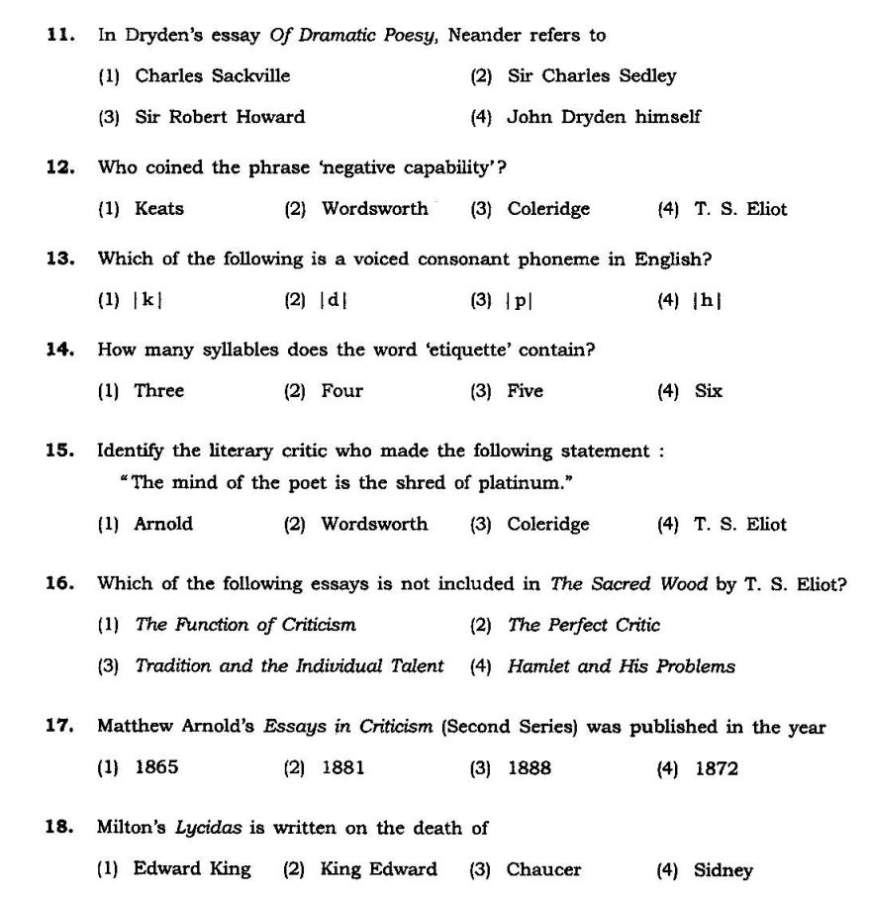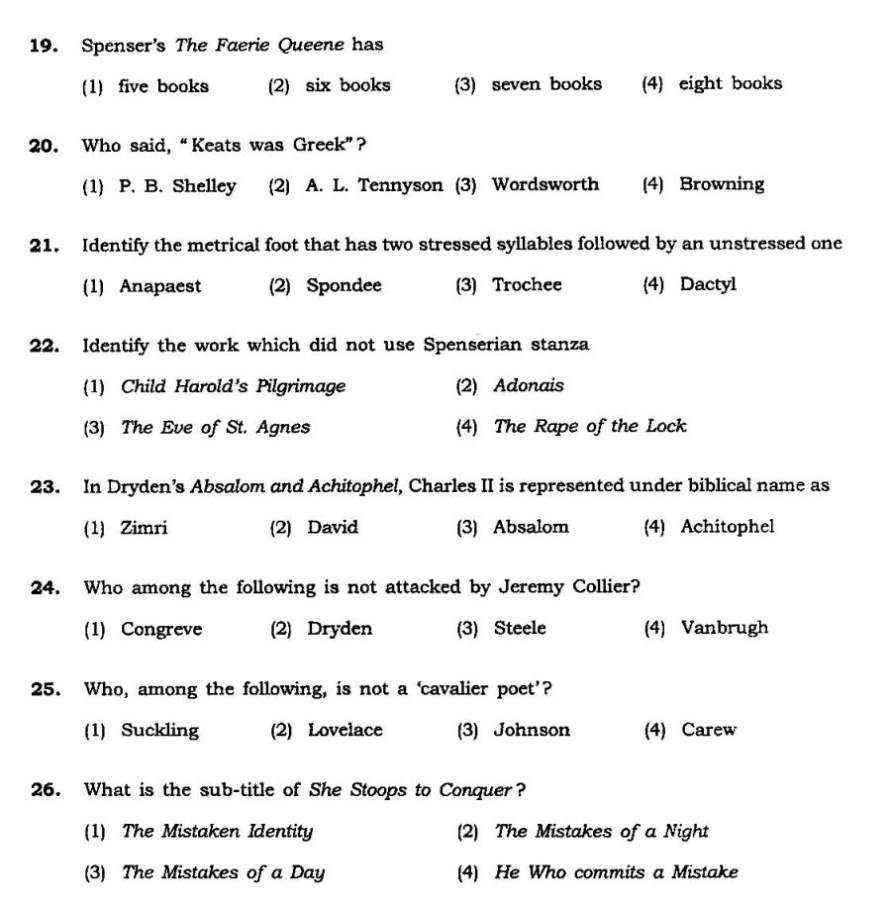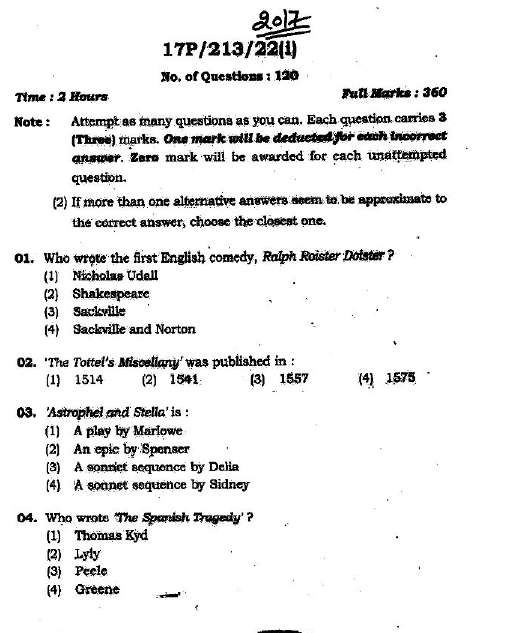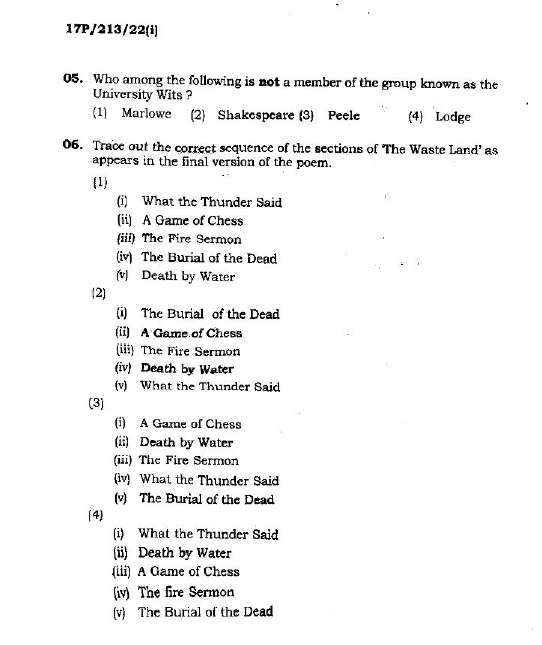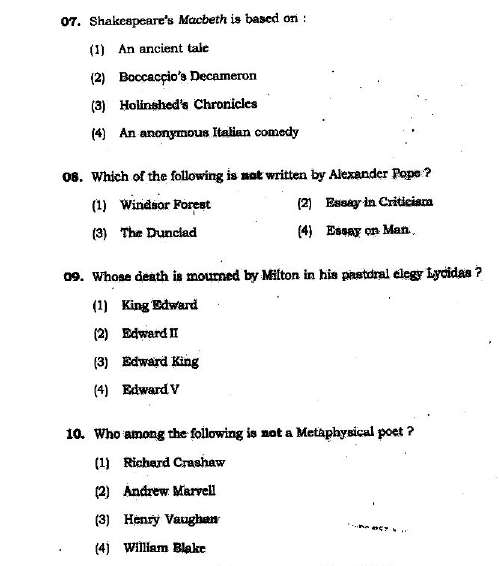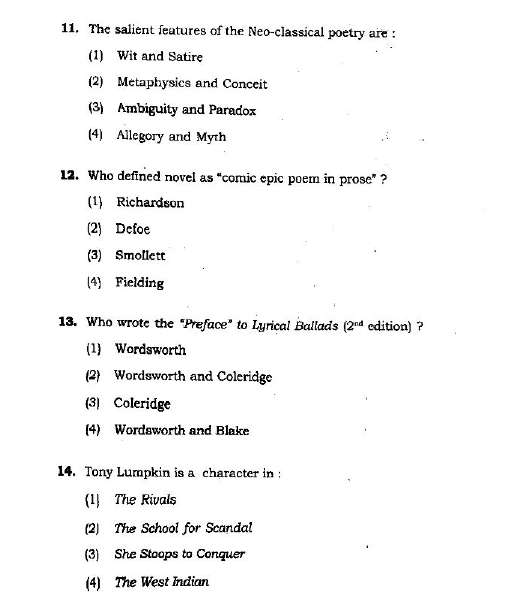|
#2
3rd August 2014, 02:02 PM
| |||
| |||
| Re: Banaras Hindu University MA English entrance exam last year question papers
As you want to get the Banaras Hindu University MA English entrance exam last year question papers so here it is for you: Some content of the file has been given here: 1. Who wrote the famous play Every Man in His Humour? (I) Ben Jonson (2) Christopher Marlowe (3) Fletcher (4) Webster 2. Who wrote the book Culture and Anarchy? (1) Matthew Arnold (2) John Ruskin (3) Lord Tennyson (4) Robert Browning 3. Which Victorian poet described poetry as 'a criticism of life' ? (I) Matthew Arno1d (2) John Ruskin (3) Lord Tennyson (4) Robert Browning 4. Who wrote Alice in Wonderland? (1) Edward Lear (2) Lewis Carroll (3) Austin Dobson (4) Shirley Brooks 5. Identify the novel Charles Dickens never wrote (1) The Old Curiosity Shop (3) Dombey and Son (2) The Pickwick Papers (4) Peg Woffington 6. Who wrote Wuthering Heights? (1) Emily Bronte (3) George Eliot (2) Charlotte Bronte (4) Mr. Gaskell 7. Point out the novel Thomas Hardy never wrote (I) The Return of the Native (2) Jude the Obscure (3) Under the Greenwood Tree (4) A Changed Woman 8. Who among the Victorians wrote Modem Painters? (I) Matthew Arnold (2) John Ruskin (3) D. G. Rossetti (4) Cardinal Newman 9. Who wrote A Few Don'ts by An Imagiste? (I) Ezra Pound (2) T. S. Eliot (3) F. S. Flint (4) T. E. Hulme 10. Who wrote the play Bali : the Sacrifice? (1) Girish Karnad (3) Mahesh Dattani 11. Lycidas written by John Milton is aj an (2) Vijay Tendu1kar (4) R. N. Tagore (1) epic (2) pastoral elegy (3) ode 12. Which of the following statements is correct? (1) The name Lycidas comes from Theocritus' Idylls (2) The name Lycidas comes from Homer's Illiad (3) The name Lycidas comes from Seneca's Herodotus (4) The name Lycidas comes from John Manicola's Cry-silus (4) tragedy 13. On the banks of which river was the poem TIntem Abbey written by Wordsworth? (1) Thames (2) Wye (3) Charwell (4) Cam 14. Who was with Wordsworth when he went around the Tintern Abbey? (1) S. T. Coleridge (3) HartleYColeridge (2) Dorothy (4) De Quincey 15. In which poem did Wordsworth write the following lines? The floating clouds their state shall1end To her; for her the willow bend; (1) TIntem Abbey (2) Three Years She Grew (3) The Prelude (4) I Wandered Lon.ely as a Cloud 16. What is the name of the girl that Wordsworth talked about in Three Years She Grew ? (1) Anne (2) Dorothy (3) Lucy (4) Elizabeth 17. Which poetic fann did P. B. SheUey employ in writing the Ode to the West Wind? (1) Terza Rima (2) Heroic Couplet (3) Blank Verse (4) Spensarian Stanza 18. Who said that" Poets are the unacknowledged legislators of the world"? (1) Wordsworth (2) Keats (3) Shelley (4) Byron 19. In which country did Shelley write Stanzas Written in Dejection Near Naples? (1) France (2) England (3) Italy (4) Greece 20. In which poem do the following lines appear? That I might drink, and leave the world unseen, And with thee fade far way into the forest dim. (1) Ode to Autumn (2) Ode to a Nightingale (3) Ode on a Grecian Um (4) Ode to Melancholy 21. In which poem do the following lines appear? (262) Season of mists and mellow fruitfulness Close bosom-friend of the maturing sun Conspiring with him how to load and bless. (1) Ode to Melancholy (3) Ode to Autumn 4 (2) Ode to Psyche (4) Ode to the West Wind 22. Why was Tithonus sad in Tennyson's poem? (I) Because being immortal, death could not release him (2) Because his beloved had left him for a younger man (3) Because his children would not bother about him (4) Because sadness came to him naturally 23. In which poem do the following lines appear? Thou seest all things, thou will see my grave: Thou wilt renew thy beauty mOTn by morn; (1) Tothonus (2) Break, Break, Break (3) Ulysses (4) Lady of Shallot 24. Who is the friend that Tennyson grieves for in Break, Break, Break? (1) Jack Dawson (3) Roderik Random (2) Arthur Hallam (4) Robert Browning 25. The Duke in Robert Browning's My Last Duchess was the duke of which place? (1) Harrara (2) Karrara (3) Carrara 26. In which poem of W. B. Yeats do the following lines occur? (262) Turning and Turning in the widening gyre The falcon cannot hold the falconer; Things fall apart; the center cannot hold; (1) The Second Coming (2) A Vision (3) Leda and the Swan (4) Lapis Lazuli 5 (4) Ferrara 27. With which Indian poet did W. B. Yeats enjoy a fine friendship? (1) Vivekananda (3) R. N. Tagore (2) Bankim Chandra (4) P. Swami 28. In which poem of W. B. Yeats do the following lines occur? This other man I had dreamed A drunken, vainglorious lout He had done most bitter wrong To some who are near my heart (1) Easter 1916 (2) The Second Coming (3) Sailing to Byzantium (4) Leda and the Swan 29. What was the name of Candida's husband in Shaw's play? (1) Eugene Marchbanks (3) Rev. Alexander Hi! (2) James Morell (4) Mr. Burgess 30. What is the main theme of G. B. Shaw's Candida? (1) Love always triumphs (2) One should not secretly fall in love with one's secretary (3) Morell was a fool (4) A woman must make a choice between two men in her life 31. Shaw has himself written that 'Candida is a counterpoint to (1) Ibsen's Doll's House' (2) Galsworthy's Justice' (3) Galsworthy's Strife' (4) Ibsen's Ghosts' 32. In which year was John Osborne's Look Back in Anger first performed? (I) 1966 (2) 1956 (3) 1957 (4) 1960 33. Who is Alison in Look Back in Anger? (1) Jimmy Porter's wife (2) Jimmy Porter's mother (4) Jimmy Porter's girlfriend (3) Jimmy Porter's sister 34. What was the name of Jimmy Porter's friend who shared his lodgings with him? (I) Skiff (2) Cliff (3) Rick (4) Paul 35. To which social class did Jimmy Porter belong? (1) Upper class (3) Upper-middle class (2) Middle class (4) Working class 36. Who utters the following lines in Look Back in Anger? "You're hurt because everything's changed and Jimmy's hurt because everything's stayed the same" (I) Alison (2) Helena (3) Col. Redfern (4) Cliff 37. Who wrote the following words and in which essay? So ambitious men, if they find the way open for their rising, and still get forward, they are rather busy than dangerous; but if they be checked in their desires, they become secretly discontent, and look upon men and matters with an evil eye, and are best pleased, when things go backward; which is the worst property in a servant of a prince, or state. (1) Ben Jonson, The Progressive Man (2) Bacon, Of Ambition (3) Ben Jonson, Of Ambition (4) Bacon, The Progressive Man 38. Identify the essay which contains the following lines? (262) Crafty men contemn studies, simple men admire them, and wise men use them; for they teach not their own use; but that is a wisdom without them, and above them, won by observation. Read not to contradict and confute; nor to believe and take for granted; nor to find talk and discourse; but to weigh and consider. (1) Of Studies (2) Of Ambition (3) Of Knowledge (4) Of Reading 39. Identify the essay which has the following lines? He that travelleth into a country, before he hath some entrance ... tile language, goeth to school, and not to travel. That young men travel under mme tutor, or grave servant. I allow well; so that he be such a one that 1:aa!t the language. and bath been in the country before; whereby he may be able to Id. ~ what things are worthy to be seen, in the country where they ~ what acquaintances they are to seek; what exercises, or discipline, the place, ....... 1"_ (I) Of Travel (2) Of Ambition (3) Of Inhibition (4) Of Prohi_ 40. Who wrote the following lines? The ladies of the present day are very much laughed at by their liege Iards (but that happens in every age of the world) for their extravagant co~ 6e high hats, waving, or stationary plumes, the audacious military po ...... the excessively prononcee style in which some ladies dress their high heads (I) Addison (2) Steele (3) Charles Lamb (4) Jane A ...... 41. In which essay did Addison write the following lines? (262) As Sir Roger is landlord to the whole congregation, he keeps them iD ft:I'Y good order, and will suffer nobody to sleep in it besides himself; for if by cb.yr he has been surprised into a short nap at sermon, upon recov~ring out of it be stands up and looks about him, and if he sees any body else nodding, either wakes them himself, or sends his servants to fuem. Several other of the old Knight's particularities break out upon fuese occasions. Sometimes he will be kngthening out a verse in the singing-psalms, half a minute after the rest of the mngregation have done with it; sometimes, when he is pleased with the matter of his devotion, he pronounces Amen three or four times to the same prayer; and smnetimes stands up when every body else is upon their knees, to count the c  ogregation, or ogregation, orsee it any of his tenants are missing. (1) Sunday Guests (3) The Picture Gallery 8 (2) Sunday in the Country (4) Mr. Will Wimble 42. In which essay did Charles Lamb write the following lines? I confess that I do feel the differences of mankind, national or individual, to an unhealthy excess. I can look with no indifferent eye upon things or persons. Whatever is, is to me a matter of taste or distaste; or when once it becomes indifferent, it begins to be disrelishing. I am, in plainer words, a bundle of prejudices-made up of likings and dislikings-the veriest thrall to sympathies, apathies, antipathies. In a certain sense, I hope it may be said of me that I am a lover of my species. I can feel for all indifferently, but I cannot feel towards all equally. (1) Imperfect Sympathies (2) Christ's Hospital (3) Dream Children (4) The Chimney Sweepers 43. Who wrote the lines given below? A poor relation is the most irrelevant thing in nature, a piece of impertinent correspondency, an odious approximation, a haunting conscience, a preposterous shadow, lengthening in the noontide of your prosperity, an unwelcome remembrancer, a perpetually recurring mortification, a drain on your purse, a more intolerable dun upon your pride, a drawback upon success, a rebuke to your rising, a stain in your blood, a blot on your scutcheon, a rent in your garment, a death's head at your banquet, Agathocles' pot, a Mordecai in your gate, a Lazarus at your door, a lion in your path, a frog in your chamber, a fly in your ointment, a mote in your eye, a triumph to your enemy, an apology to your friends, the one thing not needful, the hail in hanrest, the ounce of sour in a pound of sweet. (1) Charles Bronson (2) Charles Lamb (3) De Quincey (4) R. L. Stevenson 44. Who wrote The Treasure Island, Kidnapped, and The Strange Case of Dr. Jekyll and Mr. Hyde? (1) Ro bert Louis Stevenson (3) Felicia Hemans (262) 9 (2) Walter Scott (4) Thomas Hardy (P. T. 0.) llP/213/30 45. Who wrote the following lines and what was the title of the work? Idleness so called, which does not consist in doing nothing, but in doing a great deal not recognised in the dogmatic formularies of the ruling class, has as good a right to state its position as industry itself. It is admitted that the presence of people who refuse to enter in the great handicap race for sixpenny pieces, is at once an insult and a disenchantment for those who do. A fine fellow (as we see so many) takes his determination, votes for sixpences, and in the emphatic Americanism, it "goes for" them. (1) Hazlitt. Indian Jugglers (3) Stevenson. An Apology for Idlers (2) Wordsworth. Preface to Poetry 1802 (4) Russell. In Praise of Idleness 46. Who wrote the following lines? It must not be imagined that a walking tour. as some would have us fancy. is merely a better or worse way of seeing the country. There are many ways of seeing landscape quite as good; and none more vivid, in spite of canting dilettantes, than from a railway train. But landscape on a walking tour is quite accessory. He ~ .. ho is indeed of the brotherhood does not voyage in quest of the picturesque, but of certain jolly humours-of the hope and spirit with which the march begins at morning, and the peace and spiritual repletion of the evening's rest. He cannot tell whether he puts his knapsack on, or takes it off, with more delight. The excitement of the departure puts him in key for that of the arrival. Whatever he does is not only a reward in itself, but will be further rewarded in the sequel; and so pleasure leads on to pleasure in an endless chain. (1) Robert L. Stevenson (2) Robert Frost (3) Charles Lamb (4) Charles Dickens 47. Fill in the blank appropriately: An ............. is a lengthy narrative poem, ordinarily concerning a serious subject containing details of heroic deeds and events significant to a culture or nation. (1) epic (2) ode (3) tragedy (4) comedy 48. Who among the following authors did not write an epic? (I) Homer (2) Virgil (3) Dante Alighieri (4) Shakespeare 49. Cautiously flU in the blank : An ............. is a mournful, melancholic 'Or plaintive poem especially a funeral song or a lament for the dead. (I) elegy (2) ode (3) poem (4) sonnet 50. Fill in the blank with the most appropriate answer A classic ............. is structured in three major parts the strophe, the antistrophe and the epode. (I) epIc (3) lyric (2) ode (4) dramatic monologue 51. Which of the following statements is incorrect? (1) Lyric poetry is a form of poetry that expresses a subjective, personal point of view (2) Lyric, from the Greek language, a song sung with a lyre (3) Lyric, the composition in verse which is sung to a melody to constitute a song (4) Lyric is a classification of voices 52. A sonnet is a poem of (I) 14 lines (2) 16 lines (3) 12 lines (4) 18 lines 53. An English or a Shakespearean sonnet ends with (I) ten syllables (2) iambic pentameter (3) an alexandrine (4) a couplet 54. The ftrst known sonnets in English were written by (1) Shakespeare and Spenser (2) Donne and Milton (3) Edna Vincent St. Millay and Henry Howard (4) Wyatt and Surrey 55. Which of the four features mentioned below is not characteristic of the dramatic monologue? (1) A single person, who is patently not the poet, utters the speech that makes up the whole of the poem, in a specific situation at a critical moment (2) This person addresses and interacts with one or more other people; but we know of the auditors' presence, and what they say and do, only from clues in the discourse of the single speaker (3) The main principle controlling the poet's choice and formulation of what the lyric speaker says is to reveal to the reader, in a way that enhances its interest, the speaker's temperament and character (4) The speaker interacts with other characters and they reply back to him directly in the poem in dialogues Instructions : (Question No. 56 to 71) Read carefully and fill in the blank with correct option. 56. Iambic pentameter is one of many meters used in poetry and drama. It describes a particular rhythm that the words establish in each line. That rh)-wm is measured in small groups of syllables; these small groups of syllables are called ~ (1) syllabi (2) iambs (3) feet (4) strEssed vowels 57. Hyperbole, taken from ancient Greek, is a figure of speech in which statements are ............. It may be used to evoke strong feelings or to create a strong impression, but is not meant to be taken literally. (1) understated (2) fmely stated (3) truly stated (4) exaggerated (262) 12 llP(213(30 58. A........ ..... is a traditional form for English poetry, commonly used for epic and narrative poetry; it refers to poems constructed from a sequence of rhyming pairs of iambic pentameter lines. The rhyme is always masculine and its use was first pioneered by Geoffrey Chaucer in the Canterbury Tales. (1) sonnet (2) tetrameter (3) heroic couplet (4) metaphor 59. . .......... '" 'goat song' is a form of art based on human suffering that paradoxically offers its audience pleasure. (I) Tragedy (2) Comedy (3) Farce (4) Burlesque 60. .. ........... is a literary or rhetorical stylistic device that consists in repeating the same consonant sound at the beginning of several words in close succession. (1) Alliteration (2) Rhythm (3) Similie (4) Metaphor 61. In phonetics, a/an ............. is a sound in spoken language. such as English ah! [a:] or oh! IoU]. pronounced with an open vocal tract so that there is no build-up of air pressure at any point above the glottis. (I) vowel (2) consonant (3) alliteration (4) rhythm 62. In articulatory phonetics, a ............. is a speech sound that is articulated with (262) complete or partial closure of the vocal tract. Examples are [ p] , pronounced with the lips; { t ]. pronounced with the front of the tongue; [kJ , pronounced with the back of the tongue; [ h J • pronounced in the throat; { f I and { s] • which are noisy (fricatives); and {m] and [nJ, which have air flowing through the nose (nasals). (I) vowel (2) consonant (3) rhythm (4) hyperbole 63. An affIX is a ............. that is attached to a word stem to form a new vrord_ (1) morpheme (2) strophe (3) caesura (4) feet 64. . ............ is the identification. analysis and description of the structure of ... •ords. (1) Cliti. (2) Syntax (3) Lexi 14) Morphology 65. A ............. is the smallest meaningful unit in the grammar of a language. (1) morpheme (2) clitis (3) foot (4) vowel 66. AI An ............. is a combination of a verb and a preposition, a verb and an adverb, or a verb with both an adverb and a preposition, any of which are part of the syntax of the sentence, and so are it complete semantic unit. (1) phrasal verb (2) particle verb (3) idiomatic verb (4) informal verb 67. In linguistics, a compound is a .. " ......... (less precisely. a word) that consists of more than one stem. (1) verbeme (2) morpheme (3) conseme (4) lexeme 68. . ............ is a type of linguistic compound (inflectional verbal compounds, on a par with the bahuvrihi and tatpurusha types. It is derived from a [mite verbal phrase, the verbal inflection stilI visible at the juncture of the compound members. (1) Terpsimbrotos (2) Be-t-harmon (3) Phere-oikos (4) Ptolemos 69. For languages with a long written history. ,............ make use of texts in these languages, and texts about the languages, to gather knowledge about how words were used at earlier stages, and when they entered the languages in question. (1) entymologists (2) etymologists (3) cytologists (4) cryptologists 70. . ............ is the Philology of the Greek, Latin and Sanskrit languages. (1) Renaissance Philology (2) Modern Philology (3) Post-modern Philology (4) Classical Philology 71. In the 19508, ............. began developing his theory of generative grammar, which has undergone numerous revisions and has had a profound influence on linguistics. His approach to the study of language emphasizes "an innate set of linguistic principles shared by all humans" known as universal grammar, "the initial state of the language learner", and discovering an "account for linguistic variation via the most general possible mechanisms". (1) Saussure (2) B. F. Skinner (3) Noam Chomsky (4) Zargosa 72. Jean-Baptiste Poquelin, mostly known by his stage name Moliere, (January 15, 1622 to February 17, 1673) was a French playwright and actor who was considered one of the greatest masters of comedy in Western literature. Among his famous plays is (I) Tartuffe or the Hypocrite (2) Frogs (3) Merry Wives of Windsor (4) The Doctor in Love 73. itA sign is the basic unit of language (a given language at a given timet. Every language is a complete system of signs. Parole (the speech of an individ!1a1) is an external manifestation of language." Who made this famous claim? (1) Chomsk;y (3) Claude Levi-Strauss (2) Roman Jakobson (4) Saussure 74. Who wrote the Course in General Linguistics (Cours de linguistique ghterale)? (1) Saussure (2) Chomsky (3) B. F. Skinner (4) Roman Jakobson 75. Read carefully and fill in the blank with correct option : ............. is the Science that studies written and oral texts as the product of human mental processes. (1) Comparative Philology (3) Cognitive Philology (2) Literary Philology (4) Ancient Philology 76. Choose the right word to make the following sentence grammatically correct : David ............. to relax at the weekend. (1) enjoys (2) would rather (3) likes better (4) prefers 77. Choose a suitable verb or verb phrase to make the following sentence grammatically COllf'ect : (262) The manufacturer ............. to meet the client. (1) was refusing (3) doesn't accept 16 (2) was willing (4) looks forward 78. Choose a suitable verb or verb phrase to make the following sentence grammatically correct The girl .... , ........ to do it. (I) can't help (2) stopped (3) doesn't feel like (4) saw him 79. Read carefully and fill in the blank with correct option: In most languages with adjectives, they form an open class of words; that is, it is relatively common for new adjectives to be formed via such processes as ............ . (1) derivation (2) motivation (3) calculation (4) addition 80. Identify the incorrect statement (I) A polyseme is a word or phrase with tnultiple, related meanings (2) A word is judged to be polysemous if it has two senses of the word whose meanings are not related (3) Since the vague concept of relatedness is the test for polysemy, judgments of polysemy can be very difficult to make (4) Because applying pre-existing words to new situations is a natural process of language change, looking at words' etemology is helpful in determining polysemy but not the only solution; as words become lost in etymology, what once was a useful distinction of meaning may no longer be so. 81. Read carefully and flll in the blank with correct option : (262) ............. are linked via a copula or other linking mechanism to the noun or pronoun they modify. (1) Attributive adjectives (2) Predicative adjectives (3) Absolute adjectives (4) Substantive adjectives 82. Who wrote The Faerie Queene? (1) Abraham Cowley (2) Edmund Spenser (3) John Milton (4) Geoffrey Chaucer 83. Who wrote Absalom and Achitophel ? (1) Alexander Pope (2) John Dryden (3) Blake (4) Cowper 84. Which famous English poet wrote an Essay on Criticism in verse? (1) John Dryden (3) Chaucer (2) Alexander Pope (4) Milton -85. Who wrote the Rape of the Lock and the Dunciad? (1) John Dryden (3) Spenser (2) Alexander Pope (4) Matthew Amold 86. Which well-known poet 'WI'ote an Essay on Dramatic Poetry (1665)? (1) Lord Halifax (3) John Dryden (2) Dr, Johnson (4) Alexander Pope 87. Which two friends edited the Tatler and the Spectator? (262) (I) Wordsworth and Coleridge (3) Smollett and Goldsmith 18 (2) Addison and Steele (4) Hooker and Brown 88. Who wrote Robinson Cmsoe? (1) Samuel Smith (2) Daniel Defoe (3) Chris Wellesley (4) John Bunyan 89. Identify the book that Jonathan Swift did not write? (1) The Tale of a Tub (2) The Battle of Books (3) Gulliuer's Travels (4) Last Flight to Venus 90. For what Samuel Pepys is famous? (1) His novels (2) His diary (3) His plays (4) His poems 91. Mark the two plays of Sheridan that stand out as the fmest examples of the comedy of manners (I) The Careless Husband and The Non~uror (2) The Rivals and The School for Scandal (3) A Bold Stroke for a Wife and Tom Thumb (4) The Busybody and The Constant Couple 92. What sort of novels did Horace Walpole write? (1) Gothic (2) Romantic (3) Patriotic (4) Idiotic 93. For nearly fifty years after the death of Pope, he was the most dominant figure in the literary life of his day in England. Choose the correct name (1) Richardson (2) William Morris (3) Wordsworth (4) Dr. Johnson 94. Who wrote the Vicar of Wake field 7 (1) Mrs. Ann Thale (2) Oliver Goldsmith (3) James Boswell (4) Sir Humphrey Davy 95. A fat, tubby, mild looking, smooth cheeked, ruddy-faced, little man, guiltless of any external graces; this is the man who became the idol of his day. His two novels Pamela, or Virtue Rewarded and Clarissa Harlowe are marked by sentimentality and became hugely popular in the early eighteenth century. Who was this man? (1) Samuel Richardson (2) Paul Bunting (3) Oliver Goldsmith (4) James Boswell 96. When The Life and Times of Tristram Shandy was published in 1760, Horace Walpole declared that it was the talk of the town and Dr. Johnson took exception to its indecency. Who was this author? (1) Garrick (2) Laurence Stern (3) Tobias Smollet (4) Roderick Random 97. Mark the novel that Jane Austen did not write? (1) Pride and Prejudice (2) Northanger Abbey (3) Mansfield Park (4) Marriage and Destiny 98. Identify the tendency that is least a~sociated with Romantic Poetry (1) Heightened imaginative tendency (2) Curiosity and the love of beauty (3) Subtle sense of mystery (4) Faithfulness to reality and worldly facts 99. The Lyrical Ballads first appeared in which year? (1) 1869 (2) 1798 (3) 1789 (4) 1802 100. De Quincey speaks significantly of the brooding intensity of his eye, and the bursts of anger at the report of evil doings. Coleridge found his humour 'defective'. By which revolution was Wordsworth moved deeply? (1) Green Revolution (2) Protestant Revolution (3) French Revolution (4) Silent Revolution 101. Which of the poems mentioned below was not v.rritten by Coleridge? (1) Kubla Khan (2) Christabel (3) Rhyme of the Ancient Mariner (4) Youth and Old Age 102. Identify the poem that Byron wrote (1) Don Juan (2) Women in Love (3) Seasons (4) Season of Love 103. Identify the poem that P. B. ShelIey has not written (1) The Revolt of Islam (2) Prometheus Unbound (3) Ode to the West Wind (4) Ode to Anarchy 104. Mark the poem that John Keats has not written (1) The Eve of St. Luke (3) Ode to Francesca (262) 21 (2) The Eve of St. Agnes (4) Ode to St. Mark 105. Which of the following is not written by Keats? (2) Ode to Psyche (I) Ode to Immortality (3) Ode to Humanity (4) Ode to the Seasons 106, Who wrote the Essays of Elia? (I) John Ruskin (2) Charles Lamb (3) Williarn Hazlitt (4) Carlyle 107. Who wrote The Advancement of Learning and The New Atlantis ? (2) Ben Jonson (1) Francis Bacon (3) Shakespeare (4) Christopher Marlowe 108. Who wrote The Pilgrim's Progress? (I) Francis Bacon (2) John Bunyan (3) Richard Steele (4) Joseph Addison 109. What is the main feature of Milton's poetry? (1) Romanticism (2) Neo-classicism (3) Puritanism (4) Tragedy 110. Who wrote The Confessions of an English Opium-Eater? (I) Co\eridge (2) Thomas De Quincey (3) Oscar Wilde (4) Byron 111. What was Walter Peter's position in art? (1) He stood for all social criticism (262) (2) He supported art for art's sake (3) He wanted art to serve religious ends (4) He supported feminism and Catholicism 112. In which magazine did Charles Lamb publish his essays? (1) Blackwood's Magazine (3) Edinburgh Review (2) London Magazine (4) Fraser's Magazine 113. What was Mary Wollstonecraft's main concern behind writing? (1) Religion (2) Women (3) Poetry (4) Drama 114. Of which English ruler Lord Tennyson the Poet Laureate? (1) George III (2) Queen Victoria (3) Henry VIII (4) Queen Elizabeth 115. What was Robert Browning's wife's name? (1) Anne (2) Elizabeth (3) Joan (4) Lisa 116. To which school of art did Dante Gabriel Rossetti belong? (1) lmagist (2) Symbolist (3) Vorticist (4) Pre~Raphaelite 117. Who was King Duncan's eldest in Macbeth? (1) Donalbain (2) Malcolm (3) Siward (4) Fleance 118. Who murdered King Duncan in Macbeth? (1) Lady Macbeth (2) Macbeth (3) Hecate (4) The Grooms 119. Where was Macbeth's castle located? (1) Heath (2) Inverness (3) Buckingham (4) Balmoral 120. Who was the mistress of the witches in Macbeth ? (1) First witch (2) Second witch (3) Paddock (4) Hccate 121. Why does Macbeth not sit on his chair in the banquet scene? (1) Because he was thinking of Duncan 122. (2) Because he had seen Duncan's ghost earlier (3) Because he was planning Fleance's murder (4) Because he had seen Banquo's ghost Who wrote The Argumentative Indian? ( 1) Lord Meghnad Desai (2) Amartya Sen (3) Amitav Ghosh (4) Nayantara Sehgal 123. Who wrote The Discovery of India? ( 1) Mahatma Gandhi (2) J. L. Nehru (3) Sarojini Naidu (4) Subhas C. Base 124. In which language did Mahatma Gandhi write My Experiments with Truth? (1) Gujrati (2) Hindi 125. Who wrote the Inheritance of Loss? (1) Anita Desm (3) Shashi Deshpande 126. Who wrote The Jungle Book? (1) Jim Corbett (3) W. M. Thackeray (262) (3) English (4) Marathi (2) Kiran Desm (4) Jhumpa Lahiri (2) E. M. Forster (4) Rudyard Kipling 127. Who wrote the Baoker Prize winning novel God of Small Things? (l) Anita Desai (2) Anita Nair (3) Kiran Gujral (4) Arundhati Ray 128. Who wrote The Untouchable? (1) Raja Rao (2) R. K. Narayan (3) M. R. Anand (4) G. V. Desani 129. Who wrote the play Murder in the Cathedral? (I) G. B. Shaw (2) T. S. Eliot (3) John Galsworthy (4) Harold Pinter 130. Who wrote The Songs of Innocence and of Experience in 1794? (I) Thomson (2) Blake (3) Coleridge (4) Wordsworth 131. Who wrote The Origin of Species? (I) Wilberforce (2) John Tydall (3) Charles Darwin (4) Sir Charles Lyall 132~ Who wrote The Wreck vfthe Deutschland, a long ode about the wreck of a ship in which five nuns were drowned? (I) Thackeray (2) Dante (3) Virgil (4) Hopkins 133. Who invented a new metric system called the 'sprung rhythm'? (I) Browning (2) Tennyson (3) Hopkins (4) Robert Bridges 134. Who wrote Das Capital? 11) Karl Popper (3) Karl Marx 135. Who wrote Mein Kampf? (1) Benito Mussolini (3) Winston Churchill (2) Benito Mussolini (4) V. 1. Lenin (2) Adol! Hitler (4) F. D. Roosevelt 136. Who wrote The Picture of Dorian Gray, that created sensation in English social and literary circles? (I) Lord Alfred (2) Oscar Wilde (3) Lord Douglas (4) W. S. Gilbert 137. Who wrote the comedy The Importance of Being Emest about a rakish character Ernest Worthiog? (I) Waiter Pater (2) G. B. Shaw 138. Who wrote The Namesake? (1) Jhumpa Lahiri (3) G. V. Desani (3) Oscar Wilde (4) W. E. Henley (2) Kiran Dsai (4) Saiman Rushdie 139. Who wrote The Rights of Man in which a democratic republic for Britain waS envisaged? (262) (1) Edmund Burke (3) William Godwio 26 (2) Mary Wollstonecraft (4) Thomas Paine 140. Who wrote A Vindication of the Rights of Women? (I) Mary Shelley (2) Mary Wollstonecraft (3) P. B. Shelley (4) Edmund Burke 141. Who wrote Biographia Literaria? (1) S. T. Coleridge (2) Wordsworth (3) Charles Lamb (4) Hazlitt 142. Which great romantic poet wrote Defense of Poetry ? (I) Wordsworth (2) Coleridge (3) Shelley (4) Byron 143. Who wrote Sartor Resartus (1832-34) ? (I) Leigh Hunt (2) P. B. Shelley (3) Carlyle (4) J. S. Mill 144. Who wrote the famous poem Dejection: An Ode? (I) Keats (2) Coleridge (3) Wordsworth (4) Byron 145. Who wrote Prometheus Unbound? (I) Byron (2) Shelley (3) Tennyson (4) Browning 146. Who wrote the well-known novel Sense and Sensibility? (1) Mrs. Gaskell (2) Jane Austen (3) Elizabeth Barrett Browning (4) Mary Shelley 147. Who wrote the play Waiting for Godot without any apparent plot? (I) Brecht (2) Ionesco (3) Sartre (4) Samuel Beckett 148. Who attacked prostitution in his play Mrs. Wa1Ten's Profession? (1) John Galsworthy (2) G. B. Shaw (3) Shelagh Delaney (4) Harold Pinter 149. What was Joseph Conrad's mothertongue and nationality? (1) French (2) English (3) Polish (4) German 150. Which experimental novelist wrote The Dubliners ? (1) Leopo1d Bloom (2) James Joyce (3) John Quinn (4) D. H. Lawrence For more detailed information I am uploading PDF files which are free to download: |

